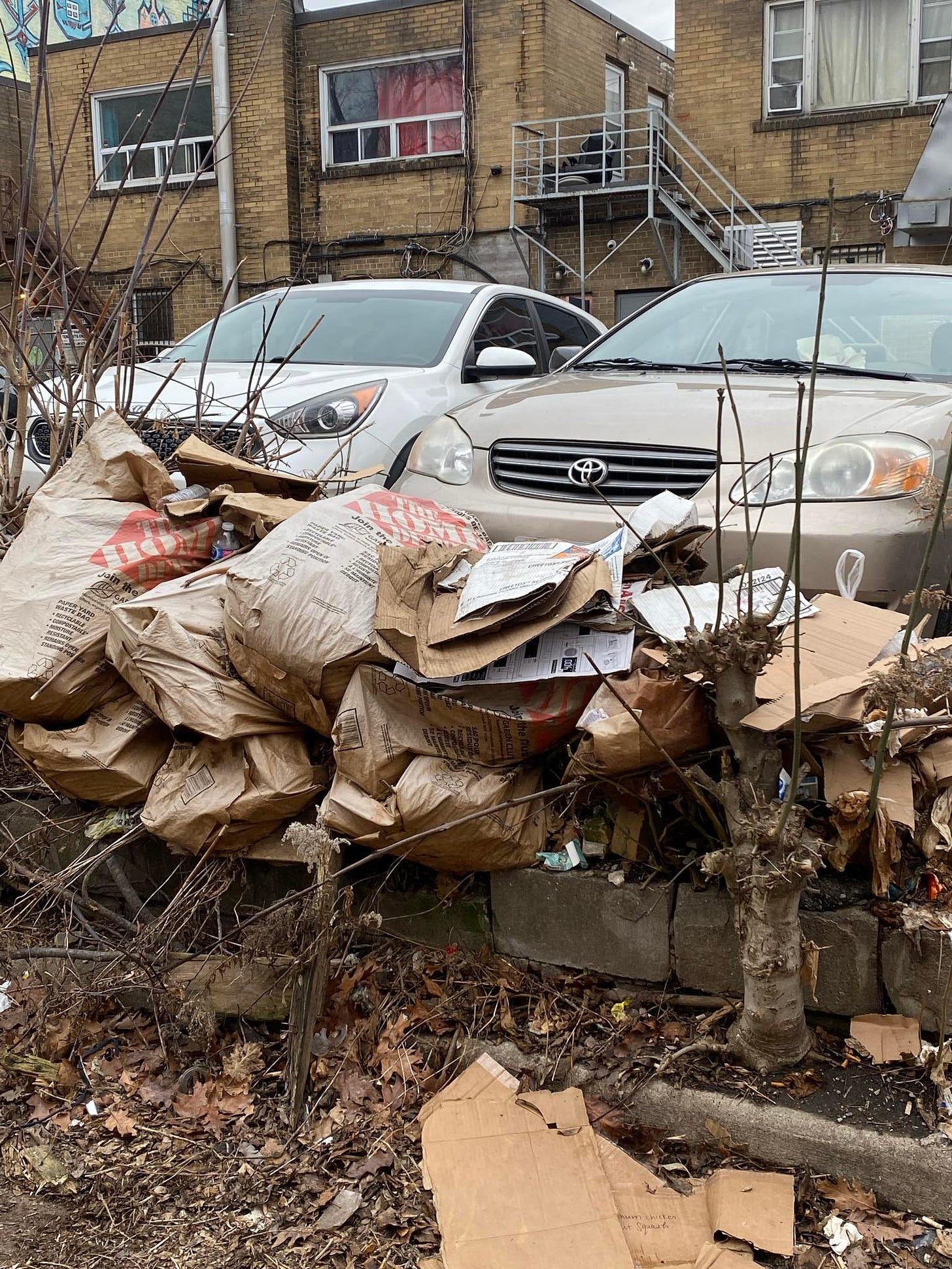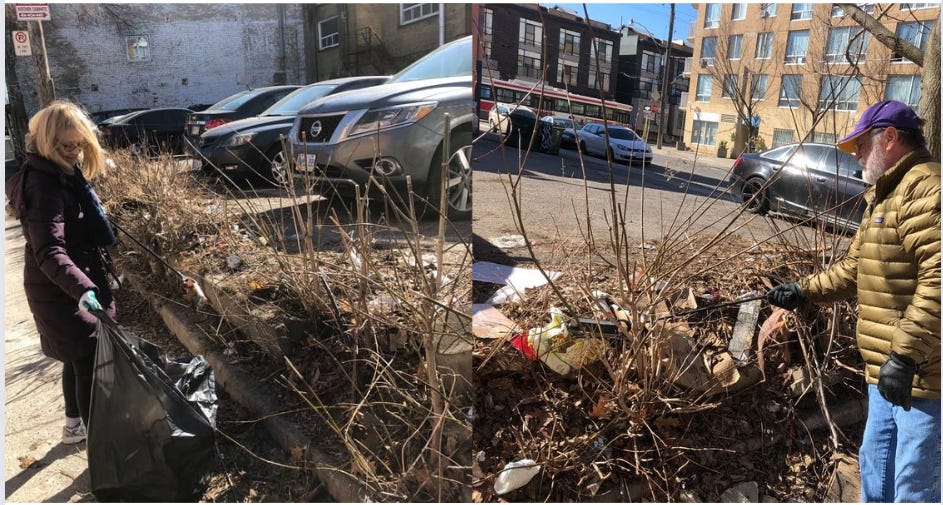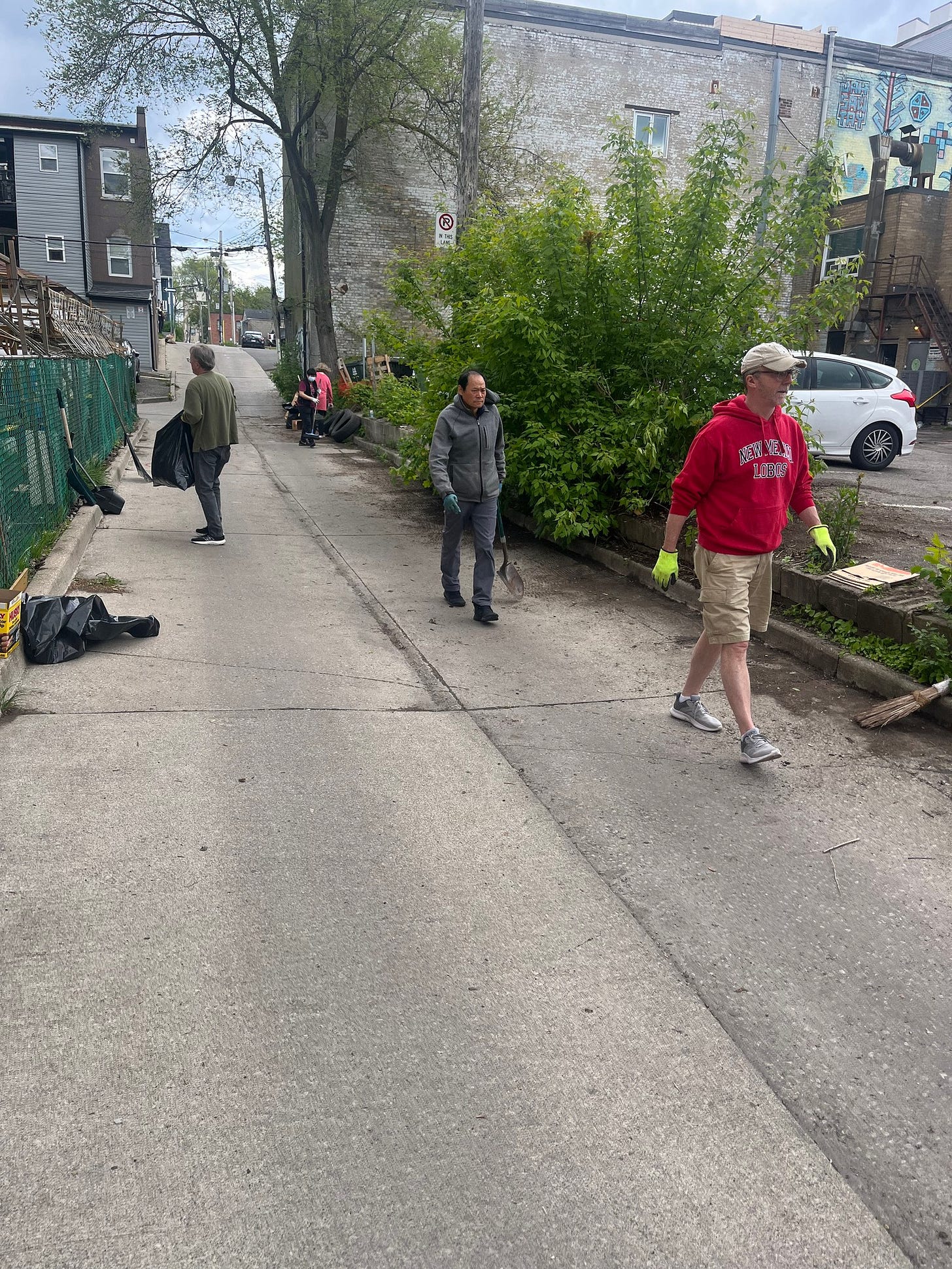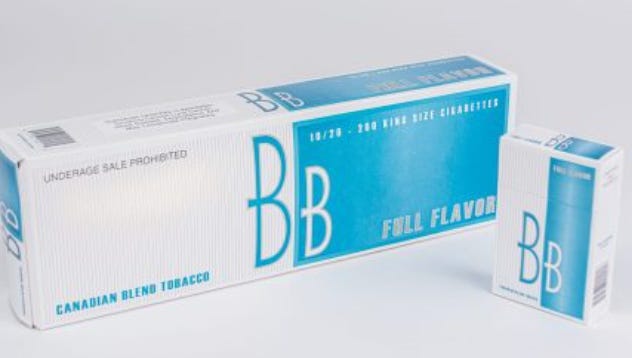The Last Straw
A trash-strewn neighborhood laneway pushed me to the brink. Compassion and the power of community pulled me back.
The alley had finally broken me.
A 30-second walk from our home in East Toronto, the alley stretched along the back of a small and crumbling parking lot that served a variety of businesses including a halal butcher, a run-down laundromat and an upscale ice-cream shop. As a community might adopt a highway, I had adopted this section of the alley, determined to keep its perpetually, prodigiously trash-strewn edges cleared of crap. But after a month and a half of steady, almost daily, effort, I abruptly reached the point any middle-aged white lady in over her head eventually reaches: rope’s end.
My breaking point came the afternoon I arrived at the alley with my litter-grabber and Hefty trash-bag, only to discover the strip looking as if I hadn’t been there in weeks. I sighed, grumbling as I dispensed with half-full Coke cans, capsized to-go containers, greasy napkins, green dog-poop bags and plastic water bottles. Then, lodged in the lower brambles of a hulking weed bush, I came across what was now a distressingly familiar sight: a dozen gloppy paper towels, an empty plastic ice cream tub and a few wadded up BB-brand cigarette packets surrounded by 20 or so butts scattered in the dirt. Disgusted and angry, I fished it all out and stuffed it in my Hefty, which I then hauled over to the giant dumpster at the side of the butcher shop. But as I heaved it over the edge, one of the dog-poop bags fell out, exploding extravagantly onto the cracked asphalt. I stared at it for a few seconds, chest heaving as I caught my breath. Then I took my spindly litter-grabber and whacked it against the side of the dumpster as hard as I could, seething with fury at all the slobs who didn’t care about keeping things nice. I kept banging and banging, until I’d smashed the cheap plastic tool to smithereens.
The laneway had menaced me on and off for the 13 years my husband, Rob, and I had lived in the neighborhood, its eyesore status growing with the jungle of weeds lining its edges. Eager to make the mess go away, I’d tried a few approaches over the years. In 2019, for example, my dad visited us from California, and he and I went to Home Hardware for litter grabbers and gloves and then dug in. That was when I realized the sheer magnitude of the task at hand. That part of the alley must have harbored a decade’s worth of garbage—giant cardboard boxes, flattened and sludged together by rainfall, stacked garden bags bulging with ancient yard-waste, discarded clothing, diapers, rags and plastic containers of every shape and size. We lasted about an hour and barely made a dent.
I also wrote to our city councilor’s office, embellishing only a little when I added that trash from the alley blew up the street into yards and driveways around the whole neighborhood. The office responded that the laneway’s edge (as opposed to the laneway itself) was private property, and that maintaining it was the owner’s responsibility. But no one there could tell me the name of the actual owner. I reached out to the office again years later—this time sending photos and all but begging for help—but I got nowhere.
And then there was the Danny Plan. The City of Toronto employs a man Rob and I like a great deal. To protect his identity (you’ll see why in a moment), I’m going to call him Danny. I knew Danny couldn’t do anything about the alley personally, but one day he did suggest a crafty workaround.
“Call 3-1-1,” he said in a low voice. “Tell them about the alley and add that you found a needle. That will get them out right away, and they will deal with it.”
A half hour later, I was on the phone with a dispatcher.
“My husband and I were taking a walk down this really trashy laneway in our neighborhood that needs cleaning up really bad, and…”
“Yes?”
“I think I maybe saw a needle.”
Just as Danny had predicted, the dispatcher took immediate interest, gathering more information and letting me know that the city would be coming to the site as soon as possible. Probably that day.
I jumped in the shower, singing showtunes and feeling triumphant. When I got out, Rob told me a city worker had just called asking to speak with me, wanting to know exactly where I’d seen the needle.
“What did you say?” I asked.
“That you weren’t here and that I didn’t know,” Rob replied. “But that you’d really been concerned.”
“Nicely done, babe,” I said, heading over toward the front window in my robe.
“Oh my god! They’re already here!” I exclaimed, pointing toward the laneway, where a cluster of city workers looked to be planning their course of attack.
I held up my hand for a high five, and Rob reciprocated.
I left the window to get dressed, but when I returned, the workers were gone. The trash was not. All they had done was prowl through the weeds, looking for a nonexistent needle. They never came back.
And then something amazing happened.
Earlier this year, a new neighbor named Matt—whose home was directly across from the alley—suggested we organize a neighborhood cleanup. We picked a date, and Matt even made and distributed signs.
On the designated Saturday morning, seven of us turned out. And seven was all it took.
It wasn’t pretty. In fact, it was about as gross and disgusting as you can imagine. We filled at least 10 Hefty bags and dredged up rolls of carpet, car parts, buckets, three tires (including one that had been lodged in a tree for at least a year) and a pallet. The City of Toronto picked up all of it.
At last, the trash tide had turned.
The alley’s make-over was beautiful, the mere sight of bare soil unblemished by embedded bottle caps and glass shards enough to fill my heart with joy. The branches of the giant weed bush were at last unsullied, the parking lot was spotless and even the recycling and garbage receptacles against the lot’s far end seemed to glisten, no longer standing in their own muck. It was a job well done.
Almost immediately, of course, things began to backslide. But I was all-in, resoundingly invested in the alley’s maintenance. Rob caught a bit of my fever and sometimes joined me, using a tiny saw to thin the masses of weedy foliage. Though most people who saw us didn’t say anything, some were outwardly supportive. A man named Khalil, who lived in a basement unit beneath the butcher shop, said he was glad to see the alley spruced up because it was like his front yard.
Tending to the alley regularly meant adapting to its patterns. Weekends were rough, because our neighborhood was replete with trendy restaurants, which meant a steady throng of people coming back to the parking lot with to-go containers, cups, straws and bottles. Weekdays were better except for the two or three times a week I’d look into the undercarriage of the weed bush and discover a strange assortment of items: a bunch of gloppy paper towels, an empty ice cream tub, wadded up cigarette packages (always the brand “BB”) and innumerable butts.
Who was this “BB” smoker, I wondered? I asked the butcher, Debbie across the street, Khalil. No one knew.
“I don’t smoke BBs!” Khalil said cheerfully, flashing both palms as if to exonerate himself.
Two weeks later, I hit upon a solution that I hoped would drive home a message to the BB smoker and his fellow polluters. I gathered a couple pieces of old insulation and some Dollarama paint and made two signs, one reading “No Dumping,” the other “No Littering.” To protect them from the elements, Rob mummified both signs in clear packing tape. We then attached them to a metal rail beside the lot’s entrance.
Khalil was heading out to his car one afternoon and noticed the signs.
“Look, miss, you’re wasting your time,” he said with a weary expression. “These people…” He gestured toward the alley. “They don’t care. It will always be like this.”
“But we have to keep trying,” I said resolutely. “We don’t want it to go back to how it was.”
Khalil just smiled sadly, raising his hand in a friendly wave as he opened his car door.
A few days later, my signs vanished, which was when I started wondering if, like Khalil said, I should just stop. Maybe my efforts were too much. Maybe some people perceived them as judgmental. Maybe I was an unwanted busybody—or maybe I was worse: Maybe I was a Karen.
And then the day came when the alley broke me, when the yucky combination of paper towels, ice cream tub and empty BB packs, along with the splatter of the dropped dog-poop bag, sent me over the edge, and I demolished my litter-grabber.
I’d fought the alley, and the alley had won.
The next day at work, I told my friend Terri the saga of the alley and the rage I’d felt during my parking-lot meltdown.
“Why were you so angry?” she asked me calmly.
“Because!” I said.
Terri, a wise one, just blinked, waiting for a better reply.
I took a breath.
“Because,” I said, “people should respect the neighborhood and the laneway, and it makes me angry that someone just goes back there and smokes and leaves his mess in the weeds!”
“You should understand something,” Terri said, her tone all-business. “Whoever’s doing this is a broken human. Trust me, that person doesn’t even know what they’re doing back there. They’re not thinking about the litter. They’re just trying to get through the night. That person doesn’t need your anger. That person needs your compassion. That’s what could fix this. Not anger. Anger never solves anything.”
“Oh,” I said.
“Why don’t you write this person a letter and leave it where they can find it?” Terri suggested. “Just say, ‘Hey, we’re trying to keep things clean around here, and we could really use your help.’”
“I guess I could,” I said, thinking that my letter would probably just be another piece of trash for me to pick up the next day.
“And maybe leave him a gift,” Terri suggested. “Maybe some cigarettes, I don’t know.”
Terri’s words seemed insightful but also outrageous. A letter? A gift? Where would I even buy BB cigarettes? I’d never so much as heard of that brand before.
When I arrived home from work that day, Rob bounded up the stairs from his office in the basement.
“Guess what?” he said. “I know who smokes BBs!”
“What?!”
I threw down my purse, grabbed a strawberry Buble from the fridge and plopped myself on the living-room floor, all ears.
Our dryer was on the fritz, and that afternoon, Rob had taken some damp clothes to the laundromat down by the laneway. It was one of the first really hot and humid days of the year, and Rob had seen a man rinsing his face at the sink near the bank of dryers. When the man turned to a mirror to comb his hair, Rob recognized Khalil, who greeted him warmly and explained he was freshening up after having worked on two construction jobs that morning. He said he often had to shave at the laundromat because his neighbors were in the habit of using up all the hot water. Khalil later mentioned his back was stiff—from the construction jobs that morning and also from having dozed off in his car the night before. He’d gone out to the parking lot to smoke, he said, because he wasn’t allowed to smoke in his apartment.
Rob’s ears perked up.
“By the way, what brand do you smoke?” Rob asked.
“BBs!”
Khalil took a pack out of his pocket and enthusiastically explained to Rob exactly why BBs were the best, which had to do with the lighter-colored tobacco and the cheaper price.
By this point, I was gob-smacked, my Buble forgotten, my jaw on the floor. Khalil had explicitly told me he didn’t smoke BBs! Did he forget Rob was married to the annoying trash lady? Or was he truly so excited about the BB brand that he just got carried away and blew his cover?
Whatever the case, I began to feel differently about the alley after that. I could sense my anger and disgust dissipating as I thought about Khalil. Terri was right; the trash under the weed bush was part of someone’s sad story, in this case a story about a man in a crappy apartment with no hot water and a catch-as-catch-can job situation, a man just looking for a peaceful place to smoke. I began to wonder if maybe all the pieces of trash in the laneway were remnants of sad stories, and if Terri was right, that all the alley really needed was compassion.
I bought a new grabber and still do my best to keep the alley picked up, but the edge I used to feel is gone. I’ve even started wondering if the filthy laneway might just turn out to be a net force for good. After all, thanks to the community clean-up in the spring, I know the names of a few neighbors I’d never met before. And the other day, Fong and Chang, a couple who participated in the spring clean-up, and who frequently tend their garden across the alley, showed me some laneway plants (which I’d thought were weeds) that were actually edible—“a Chinese vegetable,” Fong said. Yesterday, a little boy walking down the alley with his parents broke away to ask me what I was doing and then invented a game of pointing out a piece of trash and then racing me to it. And Matt’s wife said she too wants to get a litter-grabber and canvas the part of the laneway that borders her house.
The idea of a stronger community growing from the soil of a garbage-laden laneway reminds me of a passage from a book I love called A Tree Grows in Brooklyn:
[The tree] grew in boarded-up lots and out of neglected rubbish heaps and it was the only tree that grew out of cement. It grew lushly…”
In recent days, Khalil has begun stashing the goopy paper towels, empty cigarette packs and ice cream tub under his car. Wanting to show respect, I don’t touch a thing.










Your capacity for empathy is inspirational. And for me, aspirational.
Definitely not a Karen. A Karen never would've been able to consider a new point of view. Brava, Jilly!